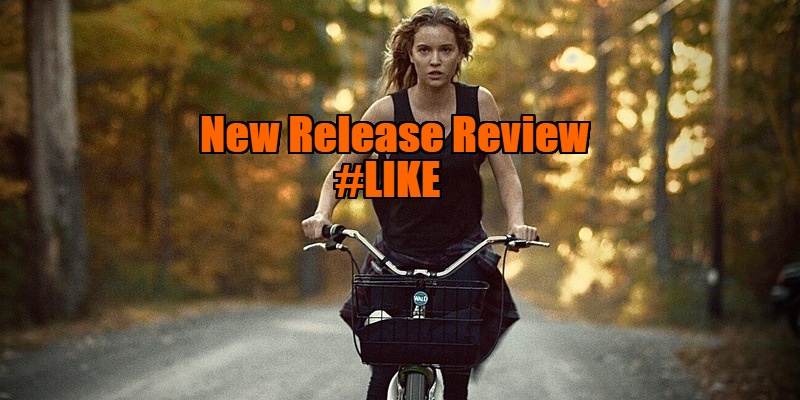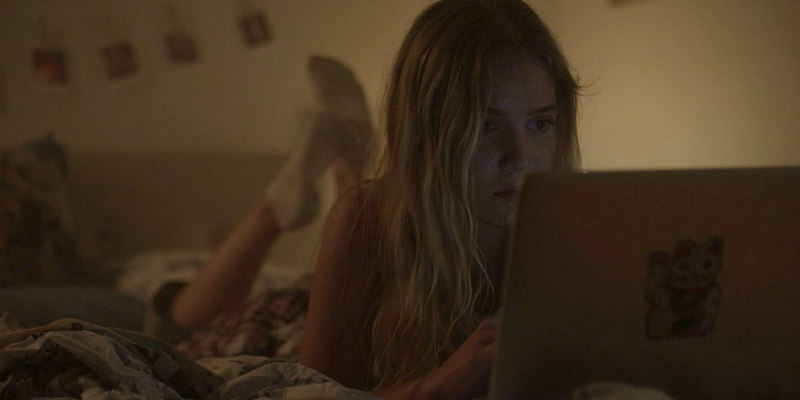
Review by
Eric Hillis
Directed by: Sarah Pirozek
Starring: Sarah Rich, Marc Menchaca, Jeff Wincott,
Dakota Lustick

Death and the Maiden gets a contemporary teen update in expat
British director Sarah Pirozek's feature debut #Like. What starts as a compelling study of a Venn-diagram of grief, anger and
confusion, anchored by a striking central performance, becomes increasingly
frustrating as it continuously relies on plot contrivances and leaps of
logic.
In leafy upstate New York, a year has passed since the suicide of 13-year-old Amelia (Samantha Nicole Dunn), an act provoked by her online sexual exploitation at the hands of an anonymous chatroom user. Amelia's mother leaves home for a work assignment, leaving her surviving daughter Rosie (Sarah Rich) alone for a couple of weeks. Rosie uses this opportunity to track down the man responsible for her kid sister's death, getting into her Facebook account and following a trail to a site where Amelia posted live video streams where, like the protagonist of Eighth Grade, she once ruminated on her life to a tiny audience.

No sooner has Rosie logged onto her late sister's account than an anonymous man pops up in the chat, claiming he's missed her during her year long absence. The man asks Amelia to go on cam, a request which Rosie obviously refuses. "I double dog dare you!" is his repeated request. When Rosie overhears a local man (Marc Menchaca) uttering the very same phrase, and spots a dreamcatcher similar to those Amelia was known to be fond of crafting hanging in his car, she follows him to a nearby playground where he appears to film playing children on his phone. Luring him to her home, Rosie drugs the man and chains him up in the basement, hoping to force a confession from him. But is he the right man or an innocent victim of circumstance?
In leafy upstate New York, a year has passed since the suicide of 13-year-old Amelia (Samantha Nicole Dunn), an act provoked by her online sexual exploitation at the hands of an anonymous chatroom user. Amelia's mother leaves home for a work assignment, leaving her surviving daughter Rosie (Sarah Rich) alone for a couple of weeks. Rosie uses this opportunity to track down the man responsible for her kid sister's death, getting into her Facebook account and following a trail to a site where Amelia posted live video streams where, like the protagonist of Eighth Grade, she once ruminated on her life to a tiny audience.

No sooner has Rosie logged onto her late sister's account than an anonymous man pops up in the chat, claiming he's missed her during her year long absence. The man asks Amelia to go on cam, a request which Rosie obviously refuses. "I double dog dare you!" is his repeated request. When Rosie overhears a local man (Marc Menchaca) uttering the very same phrase, and spots a dreamcatcher similar to those Amelia was known to be fond of crafting hanging in his car, she follows him to a nearby playground where he appears to film playing children on his phone. Luring him to her home, Rosie drugs the man and chains him up in the basement, hoping to force a confession from him. But is he the right man or an innocent victim of circumstance?
[
READ MORE: New Release Review - Passing
]
Riffs on the Death and the Maiden storyline, where a protagonist tortures someone who may or may not be responsible for a wrongdoing, have proved a popular fallback for filmmakers working to a tight budget. Essentially all you need is an interior location, a couple of skilled actors and a script that manages to keep us guessing throughout. #Like certainly has the location and both Menchaca and particularly Rich are excellent in their roles of abductee and inquisitor, but the script fails to fashion much originality from this well-worn scenario.

The trouble with this premise is that there are only two potential outcomes. Either the abducted person turns out to be guilty, thus justifying the abductor's actions, or their innocence is revealed, turning the abductor into the movie's villain. It's usually a toss of the coin - though the recent indie Pet wisely revealed its hand early on, making it a more interesting twist on this concept - but in the case of #Like, whether its accused man is guilty or not is all too obvious from the off. Thus the second half of the film is largely redundant, watchable only for Rich's startlingly good central performance.
Riffs on the Death and the Maiden storyline, where a protagonist tortures someone who may or may not be responsible for a wrongdoing, have proved a popular fallback for filmmakers working to a tight budget. Essentially all you need is an interior location, a couple of skilled actors and a script that manages to keep us guessing throughout. #Like certainly has the location and both Menchaca and particularly Rich are excellent in their roles of abductee and inquisitor, but the script fails to fashion much originality from this well-worn scenario.

The trouble with this premise is that there are only two potential outcomes. Either the abducted person turns out to be guilty, thus justifying the abductor's actions, or their innocence is revealed, turning the abductor into the movie's villain. It's usually a toss of the coin - though the recent indie Pet wisely revealed its hand early on, making it a more interesting twist on this concept - but in the case of #Like, whether its accused man is guilty or not is all too obvious from the off. Thus the second half of the film is largely redundant, watchable only for Rich's startlingly good central performance.
[
READ MORE: New Release Review - Highway One
]
When the reveal is eventually made, it feels too contrived, and it's difficult to believe Rosie could get away with her actions when there are missing posters plastered all over her town. Surely the police could simply trace the man's cellphone's GPS? Menchaca's competence can't paper over the issues with how his character is written, reacting to his abuse at the hands of Rosie not in any realistic fashion but rather in a manner that comes across clearly as an affected means of keeping his guilt/innocence ambiguous.

Perhaps it's indicative of the success of 'screen life' thrillers like Unfriended and Searching, in which all the drama plays out on their protagonists' laptop screens, that the most compelling part of Pirozek's film arrives early on, as Rosie follows a trail of cyber crumbs to track down her sister's abuser. Having a thriller play out on a computer screen is another way for a filmmaker to fashion a gripping story on a limited budget, and maybe that's the route Pirozek should have gone with this particular tale.
When the reveal is eventually made, it feels too contrived, and it's difficult to believe Rosie could get away with her actions when there are missing posters plastered all over her town. Surely the police could simply trace the man's cellphone's GPS? Menchaca's competence can't paper over the issues with how his character is written, reacting to his abuse at the hands of Rosie not in any realistic fashion but rather in a manner that comes across clearly as an affected means of keeping his guilt/innocence ambiguous.

Perhaps it's indicative of the success of 'screen life' thrillers like Unfriended and Searching, in which all the drama plays out on their protagonists' laptop screens, that the most compelling part of Pirozek's film arrives early on, as Rosie follows a trail of cyber crumbs to track down her sister's abuser. Having a thriller play out on a computer screen is another way for a filmmaker to fashion a gripping story on a limited budget, and maybe that's the route Pirozek should have gone with this particular tale.

#Like is on UK/ROI VOD from November
1st.
